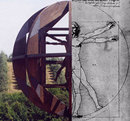Skidmore
College: Liberal Studies1
Fall 2004
Syllabus: Papers
You are responsible for writing three papers due on the dates listed on the LS 1 syllabus. Your LS 1 instructor will distribute topics for each paper in your seminar meeting. You are to prepare a working draft for each of your papers. The working draft serves as the basis for revision for the final version of your paper. To guide your revision process, your working draft may receive comments from your LS 1 seminar leader, your classmates, an LS 1 tutor, or a tutor in the Writing Center.
LS 1 papers are formal academic papers. As such, they must reflect rigorous critical thinking. As part of the process and product of critical thought, LS 1 papers should
- show a mind actively engaged with a problem
- make an argument
- bring something
new to the readers
Furthermore, your LS 1 papers must
- be grounded in ideas presented in LS 1 readings, discussion, large group presentations
- engage LS 1 materials through explicit inclusion in your paper with appropriate citation
- offer a coherent thesis statement to your readers
- present ideas in an organized fashion
- be written clearly and correctly
First and foremost,
LS 1 papers are to be thesis-driven essays. A thesis statement is a guiding
statement for an essay that presents the subject of the essay and the
writer's point-of-view (or comment) on the subject. As such, a thesis-driven
essay has a point to make; it is a pointed essay. All of the ideas and
information in the paper drive that point home to the reader. To support
your thesis, you will draw from ideas presented in LS 1 readings and large
group presentations, using direct quotations or paraphrases, as well as
from class discussion. You should follow the appropriate style for documentation
and citation outlined in the Appendix of the LS 1 reader and The
Skidmore Guide to Writing. Depending upon the paper topic, you may
also need to draw upon personal experience to support your thesis.
Do not confuse your working draft with a first draft or a rough draft. A working draft
- demonstrates the serious and thoughtful intellectual work of the writer
- works for the readers in that it makes sense to the readers
- is a work in progress, not a finished essay. No matter how strong your working draft, you will do additional work on it to bring it to completion
LS 1 does not tolerate late work. Any assignments not handed in on the due date will receive a zero. Your LS 1 instructor, however, may still provide comments on the work. All papers and projects must be completed to pass the course.
The schedule for the LS 1 papers is as follows:
| Topic for Paper #1 Distributed in Seminars | Tuesday, 7 September |
| Working Drafts of Paper #1 Due in Seminars: Peer Critique Workshop | Week of 8 September |
| Final Versions of Paper #1 Due in Seminars | Week of 13 September |
| Topics for Paper #2 Distributed in Seminars | Week of 13 September |
| Working Drafts of Paper #2 Due in Seminars | Week of 4 October |
| Final Versions of Paper #2 Due in Seminars | Week of 18 October |
| Topics for Paper #3 Distributed in Seminars | Week of 18 October |
| Optional Working Drafts of Paper #3 Due in Seminars | Consult your LS 1 discussion leader |
| Final Versions of Paper #3 Due in Seminars | Week of 22 November |
